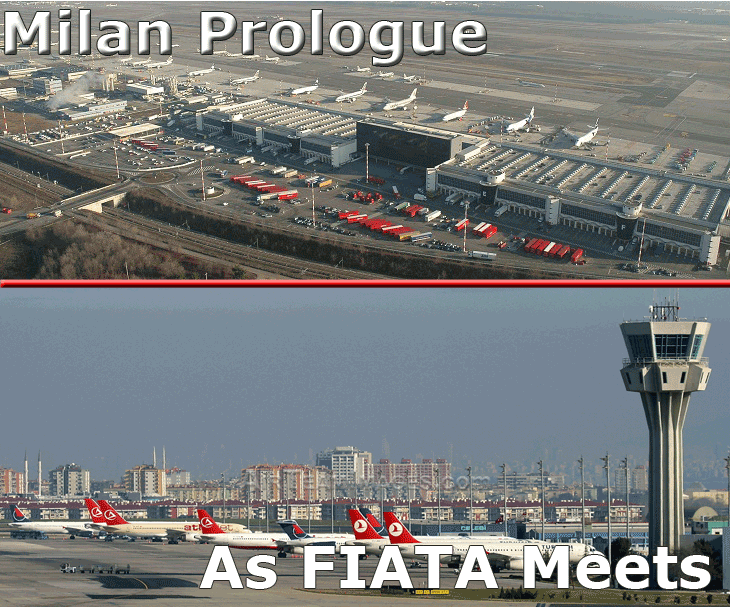| 
As FIATA
meets in Istanbul this week, past interplay between shippers and their
immediate partners—the forwarders—earlier last month at the
6th Annual Cargo Handling Conference (ACH) fits in nicely with the conversation
stream of the moment.
 Vice President Air Product EMENA at UTi Tjalling Boonstra (left) and Director
of Special Programs, Air Cargo Netherlands Ferry van der Ent spoke at
ACH under the heading of Areas for Improvement, the forwarder/shipper
view.
Vice President Air Product EMENA at UTi Tjalling Boonstra (left) and Director
of Special Programs, Air Cargo Netherlands Ferry van der Ent spoke at
ACH under the heading of Areas for Improvement, the forwarder/shipper
view.
In no-nonsense terms, Tjalling Boonstra touched
areas that sounded to us like basic training to building the relationship.
Important and obvious factors like visibility/transparency fall under
the header of what the shipper needs to know:
Where is my shipment at which time (preferably
on unit–box pallet); real-time information (automation, please);
and under which conditions are goods stored (cool chain).
The point was also made about the need for
speed: What is needed to reduce the total transit time to within two days.
“In many cases, releasing the goods
two hours earlier could result in total reduction of one day for the delivery,”
Mr. Boonstra said.
“This is a key KPI for GHA and/or
forwarders.”
Cold chain GDP was touched upon: There is
an increased need from pharmaceutical industry for control throughout
the supply chain. “Cool chain products need to be handled separately
(admin and physical) from other flows,” Mr Boonstra declares.
“There is a need for trained people
to work in a GDP compliant way.
“The industry needs to be ready to
be audited, but feedback should be taken positively.”
Reduction of costs through integration of
processes:
“There is an opportunity for ground
handling agents to provide services to smaller forwarders.
“Instead of multiple parties pick
up, delivering to GHA why not coordinate milk runs?”
There is too much focus on reducing costs:
(a little self-criticism of the shippers).
Forwarder and, consequently, the carrier
selection of the GHA is becoming more and more dominated by procurement
departments with the number one intention of reducing direct purchasing
costs.
“One way of getting out of the selection
based purely on cost can be to offer different prices for different services,
for instance, express service vs. regular handling,” Mr. Boonstra
said.
Ferry From Amsterdam
 Mr. Ferry delivered the Amsterdam view at ACH by looking at some of the
projects targeting freight forwarders and shippers.
Mr. Ferry delivered the Amsterdam view at ACH by looking at some of the
projects targeting freight forwarders and shippers.
These include:
• a
pharmaceutical center that can meet increasing demands of shippers
•
additive manufacturing (3D printing) and identifying the impact on the
future supply chain.
•
fast lanes - optimized supply chain by minimizing checks and party dependencies.
•
a consolidation center with a new definition for first and second line
use that will decrease queues and waiting times.
•
specialized engine handling and e-freight, meeting IATAs 22 percent e-AWB
ambition in 2014.
There are also plans to implement e-link,
which will enable a faster shipment delivery process (no more paper handling
and fewer personnel at the handler desk) and will shorten dwell time for
the trucker with an average of 15-minutes faster handling times.
The direct savings will result in millions
of Euros.
Shippers and consignees will also be involved
in the information exchange through the digitization of first and last
mile, including digital invoices, packing lists, certificates of origin,
shippers letters of instruction, and dangerous goods certification.
The solution recognizes that 75 percent
of the data comes from the shipper and the plan is that the database can
accept and EDI message from any system to the community portal, which
can then format the data into XML based messaging.
Ferry noted that success depends on “supply
chain performance; space and IT infrastructure are key with safety and
security also being key drivers.”
Patrick Murray Head of the leading Dubai-based
IT resource Calogi, offers his take on all of this:
“Certainly more needs to be done to
engage shippers.
“More often than not, as direct customers,
shippers drive forwarders’ behavior.
“We at Calogi have long recognized
that the data elements provided by the shipper make up a significant part
of the shipment data, hence the development 6 years ago of an online shippers
letter of instruction, which creates the forwarder shipment record.
“A connected community where data
is entered once and re-used has significant benefits; the challenge is
how do we get there.
“I have heard anecdotal evidence that
suggests that shippers currently do not share data with forwarders, and
even though forwarders offer portal services to allow shippers to capture
the data, this approach has not been popular, presumably because the shipper
has to create the data in both his own system and that of the forwarder.
“Perhaps FIATA could take the lead
at this shipper/forwarder data sharing aspect?”
Geoffrey
|





